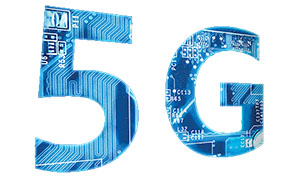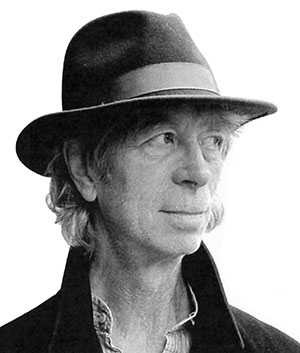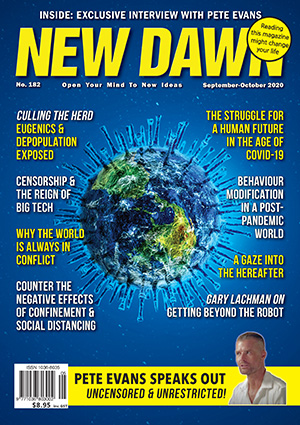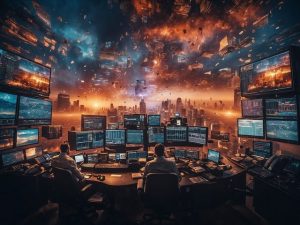The Struggle for a Human Future in the Age of COVID-19 & Electronic Totalitarianism: An Interview with Jeremy Naydler

Jeremy Naydler, Ph.D., holds a doctorate in theology and religious studies, and is a philosopher, cultural historian and gardener who lives and works in Oxford, England.
He has long been interested in the history of consciousness and sees the study of past cultures – which were more open to the world of spirit than our own, predominantly secular, culture – as relevant both to understanding our situation today and to finding pathways into the future.
His longstanding concern about the impact of electronic technologies on our inner life and on our relationship to nature has found expression in his book In the Shadow of the Machine (Temple Lodge 2018) and in his new book Struggle for a Human Future: 5G, Augmented Reality and the Internet of Things (Temple Lodge 2020).
KINGSLEY DENNIS (KD): You have said that the biggest threat of technology is not from the apparatus itself but from its corruption of the human essence. What is the major threat of technology against the human essence?

One of the purposes of the rollout of 5G is to strengthen the “global electronic ecosystem,” which our computers, large, small and tiny, all function within. But the more we live our lives through our electronic technologies, the more we become alienated from the natural world. The electronic ecosystem becomes a kind of rival to nature’s ecosystems, in the sense that it is the environment in which we spend more and more of our time, never more so than in these last pandemic months. But if the world we feel most safe in is the world mediated by the light of computer screens, then what happens to our relationship to sunlight, not to mention the flowers and trees, the wind and rain?
It is important to consider how the light of the computer screen differs from sunlight. What lives in sunlight? Steiner said it is the garment of the cosmic Logos. In saying this, he was reiterating an old teaching. In the Psalms we find God described as wrapping around himself a garment of light. I can’t go into this further here. I devote a chapter to it in my book. All I will say is that the garment of light that the divine is wrapped in is not, and simply cannot be, the light that emanates from the computer screen.
KD: If Artificial Intelligence (AI) and electricity are two sides of the same phenomenon, then AI could be regarded as a manifestation of an energy in a ‘fallen state’. Would you consider AI therefore to be a manifestation of what Steiner calls the Ahrimanic forces?
JN: When we consider what kind of intelligence is referred to by the phrase “Artificial Intelligence,” it resolves into an entirely quantitative concept. It is something entirely measurable, and it is measured by the number of “calculations per second” that a machine is able to perform. Computers perform logical operations extremely fast and can therefore be programmed to produce any number of different outputs. This can give the impression that our machines are incredibly clever, much cleverer than we are, but this is a type of intelligence that excludes any real understanding. They don’t really know what they are doing. It is intelligence without consciousness. It is mere cleverness in a meaning-vacuum. It is totally soulless.
What is it, then, that is manifesting in this type of extremely clever, but utterly cold and soulless intelligence? Could one say that it is the manifestation of a spiritual being? If so, what kind of spiritual being could it possibly be? One way of answering this is to observe what kind of affect the use of Artificial Intelligence has on us in our daily lives. How do you feel, for instance, when in order to do something online you are required to enter all these details in dialogue boxes and drop down menus, and then you have to tick this box and that box, and prove that you are not a computer by interpreting some illegible script. And if you get one single detail wrong, you have to go back and in some cases start the whole process again. I personally experience a sense of constraint, as I am forced to conform to the alien requirements of these algorithms. It feels like I am encountering something fundamentally anti-human here.
It is in these small everyday experiences of interacting with this intelligence that we begin to sense the nature of what it is we are dealing with. I think it is better not to rush in with naming it, but rather try to observe as closely as we can what we are experiencing, as if we are dealing with a person, and then build up a picture of the “Who?” behind the AI. Through personifying in this way, we learn to recognise its signature in many different aspects of life. We are constantly encountering it, and we can see it too in the much bigger trends and tendencies that are occurring in the world.
KD: You have stated that one of the challenges we face today is to “overcome our collective de-sensitisation to these subtle life-forces.” What do you mean by this?
JN: Modern urban living has de-sensitised us to nature. The digital revolution has accentuated this. To attune yourself to the life-forces in nature, you have to spend a lot of time outside, in the elements, in different light conditions, in sun and in rain. You have to spend time with plants, and in relationship to the soil, to bugs, to the birds and to countless other creatures. And much of this time needs to be spent not doing anything. Just being open, and open to Being. It is what Heidegger talked about when he said “openness to Being” defines the human essence. Just to be present to what is there. In this way, we begin to overcome our collective de-sensitisation to the subtle life-forces in nature.
KD: As succinctly as possible, how do you view the short-term future for humanity and life on this planet?
JN: There’s an extremely powerful trend today in which many human beings are caught up. Many, it seems, feel they don’t really belong to the planet anymore, and are drawn increasingly into the new electronic world that has recently announced that it is an “ecosystem” in its own right! The implication is that it can offer a habitat for the human soul. It doesn’t require great insight to see that the more time people spend online, the more they withdraw their allegiance to the planet.
One of the most powerful symptoms of this withdrawal of allegiance to the planet is the fantasy of literally abandoning the Earth and colonising Mars. This fantasy has gripped the minds of some very rich and influential people, for example the billionaire entrepreneur Elon Musk and celebrity scientists like Brian Cox and the late Stephen Hawking. It is symptomatic of a kind of renunciation of our responsibility to the beautiful Earth on which we live. I think this inner renunciation has already taken place for many people, aided and abetted by their online lives, and this is why the fantasy of abandoning the Earth and leaving it to its fate seems so attractive.
This points to the crying need to take far more seriously our responsibility for nature, recognising that this Earth is where we as humans belong. It is to this Earth that our primary loyalty must lie. To shoulder this responsibility is also to shoulder the heavy weight of guilt, pain and despair that so many of us feel when we read, or see images, of the unceasing devastation that we are collectively inflicting on the Earth and our fellow creatures.
However, we need to get over the paralysing effect this has on us and look to see what we can do to heal nature’s wounds. We can join campaigns, of course, sign petitions and try to shop more carefully, but we should also attend to what is closest to us, so we stand more firmly on the Earth. Every garden, every plot of land, no matter how small or modest, is a point of contact with nature. It invites us to tend and care for it, to help to build up the life-forces in it. And if we don’t have a garden, then we can still make a point of walking in nature, even if it’s the local park, and give our attention to the daily miracles that abound. This giving of our attention to nature is absolutely crucial, because through it we root ourselves in the Earth.
Many of us feel trepidation for the future, but this feeling alone is not particularly helpful. We need to gather our strength to meet the future with equanimity and make it our daily practice to live with positivity and hope. And we need to know that the quality of our consciousness of nature is in itself a gift that each of us can bestow. If we can live with greater awareness and appreciation of the wisdom and beauty that surrounds us, that itself will make a difference.
Struggle for a Human Future: 5G, Augmented Reality and the Internet of Things by Jeremy Naydler is available from all good bookstores and online sellers.
© New Dawn Magazine and the respective author.
For our reproduction notice, click here.










